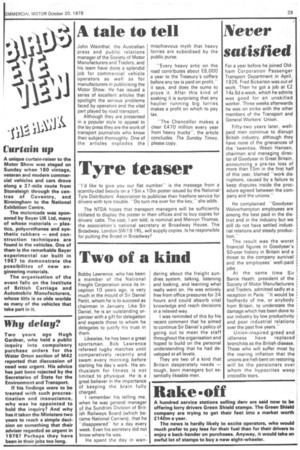Never satisfied
Page 31

If you've noticed an error in this article please click here to report it so we can fix it.
For a year before he joined Oldham Corporation Passenger Transport Department in April, 1926, Fred Bickerton was out of work. Then he got a job at £2 14s 6d a week, which he admits was good for an unskilled worker. Three weeks afterwards he was on strike with the other members of the Transport and General Workers' Union.
Fifty-two years later, wellpaid men continue to disrupt British industry, although they have none of the grievances of the 'twenties. Westi Hansen, chairman and managing director of Goodyear in Great Britain, announcing a pre-tax loss of more than £.5m in the first half of this year, blamed "work disruptions, caused by a failure to keep disputes inside the procedure agreed between the company and the unions."
He complained: "Goodyear Wolverhampton employees are among the best paid in the district and in the industry but we still do not have settled industrial relations and steady production.
The result was the worst financial figures in Goodyear's 50-year history in Britain and a threat to the company survival and the employees' well-paid jobs.
At the same time Sir Barrie Heath, president of the Society of Motor Manufacturers and Traders, admitted sadly at a reception in Paris: "It would be foolhardy of me, or anybody from Britain, to understate the damage which has been done to our industry by low productivity and poor industrial relations over the past five years."
Union-inspired greed and idleness have replaced bronchitis as the British disease. Those who will suffer most by the roaring inflation that the unions are hell-bent on restoring will be the pensioners over whom the hypocrites weep crocodile tears.








































































































































































































































































































































































